Aerial techniques, also known as "high-flying moves" are performance techniques used in professional wrestling for simulated assault on opponents. The techniques involve jumping from the ring's posts and ropes, demonstrating the speed and agility of smaller, nimble and acrobatically inclined wrestlers, with many preferring this style instead of throwing or locking the opponent.
Strikes can be offensive moves in professional wrestling, that can sometimes be used to set up an opponent for a hold or for a throw. There are a wide variety of strikes in pro wrestling, and many are known by several different names. Professional wrestlers frequently give their finishers new names. Occasionally, these names become popular and are used regardless of the wrestler performing the technique.
In professional wrestling double-team maneuvers are executed by multiple wrestlers instead of one and typically are used by tag teams in tag team matches. Many of these maneuvers are combination of two throws, or submission holds. Most moves are known by the names that professional wrestlers give their "finishing move" names. Occasionally, these names become popular and are used regardless of the wrestler performing the technique. Moves are listed under general categories whenever possible.

WWF WrestleMania 2000 is a professional wrestling video game released in 1999 on the Nintendo 64 (N64) console. It was based on the World Wrestling Federation's annual pay-per-view, WrestleMania. Despite the fact that this game is based upon WrestleMania 2000, the game was released five months prior to the actual PPV itself, therefore resulting in the game using the stage design from the 1999 event, WrestleMania XV, instead. Released at the height of the WWF's Attitude Era, WrestleMania 2000 was the first WWF game released by THQ. The wrestling company ended its long relationship with Acclaim Entertainment after witnessing the video game success of its competitor, World Championship Wrestling (WCW), on behalf of THQ. WrestleMania 2000 shares its game engine with the Japan-only release Virtual Pro Wrestling 2: Ōdō Keishō.

WWF King of the Ring is a professional wrestling video game based on the World Wrestling Federation (WWF), released in 1993 for the Nintendo Entertainment System and Game Boy. It was the final WWF game released for the NES, and third WWF game released for the Game Boy. In this game, players can vie for the title of King of the Ring by competing in an eight-man single elimination tournament. Additionally, players can battle the entire roster through a string of singles matches to become WWF Champion. Also available are exhibition matches in singles and tag team modes for one or two players.

WWF War Zone is a professional wrestling video game developed by Iguana West and released by Acclaim Entertainment in 1998 for the PlayStation, Nintendo 64, and Game Boy. The game features wrestlers from the World Wrestling Federation (WWF).

WWF Attitude is a professional wrestling video game based on the World Wrestling Federation released by Acclaim Entertainment in 1999 for the PlayStation and Nintendo 64. A slightly enhanced port of the game was later released for the Dreamcast, as well as a handheld version for the Game Boy Color. The game is named after the WWF's then-current "Attitude" marketing campaign, with the tagline "Get it" also being used on company programming during that period.
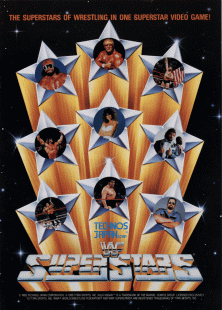
WWF Superstars is a wrestling video game manufactured by Technōs Japan and released for arcades in 1989. It is the first WWF arcade game to be released. A series of unrelated games with the same title were released by LJN for the original Game Boy. Technōs followed the game with the release of WWF WrestleFest in 1991.
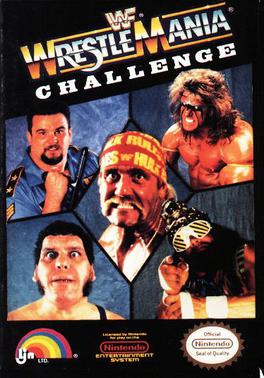
WWF WrestleMania Challenge is a professional wrestling video game based on the World Wrestling Federation (WWF), released in 1990 for the Nintendo Entertainment System by Acclaim Entertainment under the LJN label, and in 1992 for the Family Computer by Hot-B.

WWF WrestleMania is a Nintendo Entertainment System (NES) video game created by Rare and published by Acclaim Entertainment in 1989. It was the first WWF licensed NES game and the second WWF game overall, the first being MicroLeague Wrestling. WrestleMania also marked the beginning of a long relationship between Acclaim and the WWF which lasted ten years. Released just months prior to WrestleMania V, it was intended to help build up to that event. The game's title screen features the tagline for WrestleMania III: "Bigger. Better. Badder".

WWF WrestleMania: Steel Cage Challenge is a professional wrestling video game based on the World Wrestling Federation (WWF), released in 1992 by Acclaim Entertainment for the Nintendo Entertainment System and in 1993 for the Master System and the Game Gear handheld console. The NES version was subsequently released as a handheld TV game in 2018 under the name WWE WrestleMania: Steel Cage Challenge, with all references to the "WWF" name and logo replaced by "WWE".

WWF Superstars 2 is a video game based on the World Wrestling Federation (WWF), released in 1992 for the Game Boy handheld console by Acclaim Entertainment. It is the sequel to WWF Superstars and the second WWF game for the Game Boy system. The game is similar to WWF WrestleMania: Steel Cage Challenge for the Nintendo Entertainment System, although it runs much faster.

The 1990 Royal Rumble was the third annual Royal Rumble professional wrestling pay-per-view (PPV) event produced by the World Wrestling Federation. It took place on January 21, 1990, at the Orlando Arena in Orlando, Florida. It centered on the Royal Rumble match, a modified battle royal in which participants enter at timed intervals instead of all beginning in the ring at the same time.

WWF Rage in the Cage is a professional wrestling video game released by Acclaim Entertainment on December 21, 1993 for the Sega CD gaming system. It is a spin-off of sorts of LJN's 16-bit WWF games, as the gameplay engine and graphical style are the same as in WWF Royal Rumble for the Super NES and Sega Genesis, also developed by Sculptured Software.

WWF Royal Rumble is a professional wrestling video game released in 1993 for the Super NES and Sega Genesis. Like its predecessor, WWF Super WrestleMania, it is based on the World Wrestling Federation (WWF). It features a variety of match types, including the newly added Royal Rumble match. The game's roster consists of wrestlers who were top stars in the WWF at the time, and each version of the game has five exclusive playable characters.
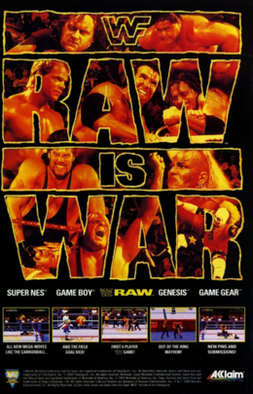
WWF Raw is a professional wrestling video game based on the television show of the same name produced by the World Wrestling Federation (WWF), released for the SNES, 32X, Mega Drive/Genesis, and Game Boy in late 1994 and early 1995 by Acclaim Entertainment. It is the sequel to the WWF Royal Rumble game that was released in 1993, and is the final part of LJN's 16-bit WWF trilogy. Players can play either One-on-One, Tag Team, Bedlam, Survivor Series, Royal Rumble, or a Raw Endurance Match. Unlike its predecessor, WWF RAW is multitap compatible.
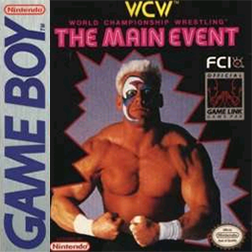
WCW: The Main Event is a professional wrestling video game released in 1994 by FCI, Inc. for the Nintendo Game Boy portable video game system. It was the second video game based on World Championship Wrestling (WCW), and the first of two released to a handheld console.

WWF WrestleMania is a game developed by Twilight and published by Ocean Software in 1991 for the Amiga, Amstrad CPC, Atari ST, Commodore 64, ZX Spectrum, and DOS. Named after the World Wrestling Federation's (WWF) annual pay-per-view event WrestleMania, it was the first WWF licensed game available for these computers which were still dominant in Europe. It was followed on most of these computers by 1992's WWF European Rampage Tour.
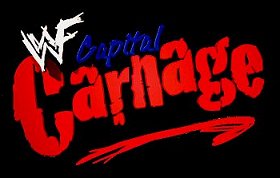
WWF Capital Carnage was a United Kingdom-only professional wrestling pay-per-view (PPV) event produced by the American promotion, the World Wrestling Federation. It took place on December 6, 1998, at the London Arena in London, England. It was released on DVD in the UK and Europe on July 12, 2010, in a set also including No Mercy (UK) as part of the WWE's Tagged Classics range released by Silver Vision, without any edits to the original content, most notably keeping all mentions and appearances of the WWF logo intact and un-blurred.

Super J-Cup: 1st Stage was the first Super J-Cup professional wrestling tournament hosted by New Japan Pro-Wrestling (NJPW). The event took place on April 16, 1994, at Sumo Hall in Tokyo, Japan. The tournament featured fourteen junior heavyweight wrestlers and was created by Jushin Thunder Liger and was the first NJPW event to feature only junior heavyweight wrestlers. The event received critical acclaim and commercial success, leading to Japanese promotions hosting more editions of the tournament, leading to the event being renamed the Super J-Cup: 1st Stage in later years.















